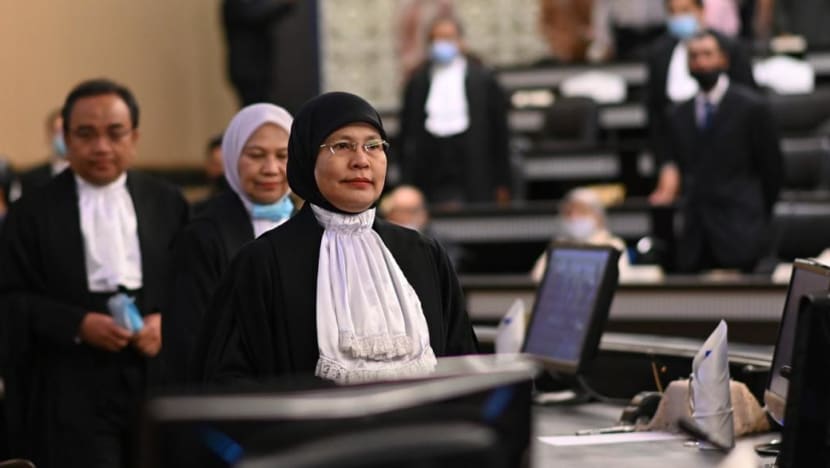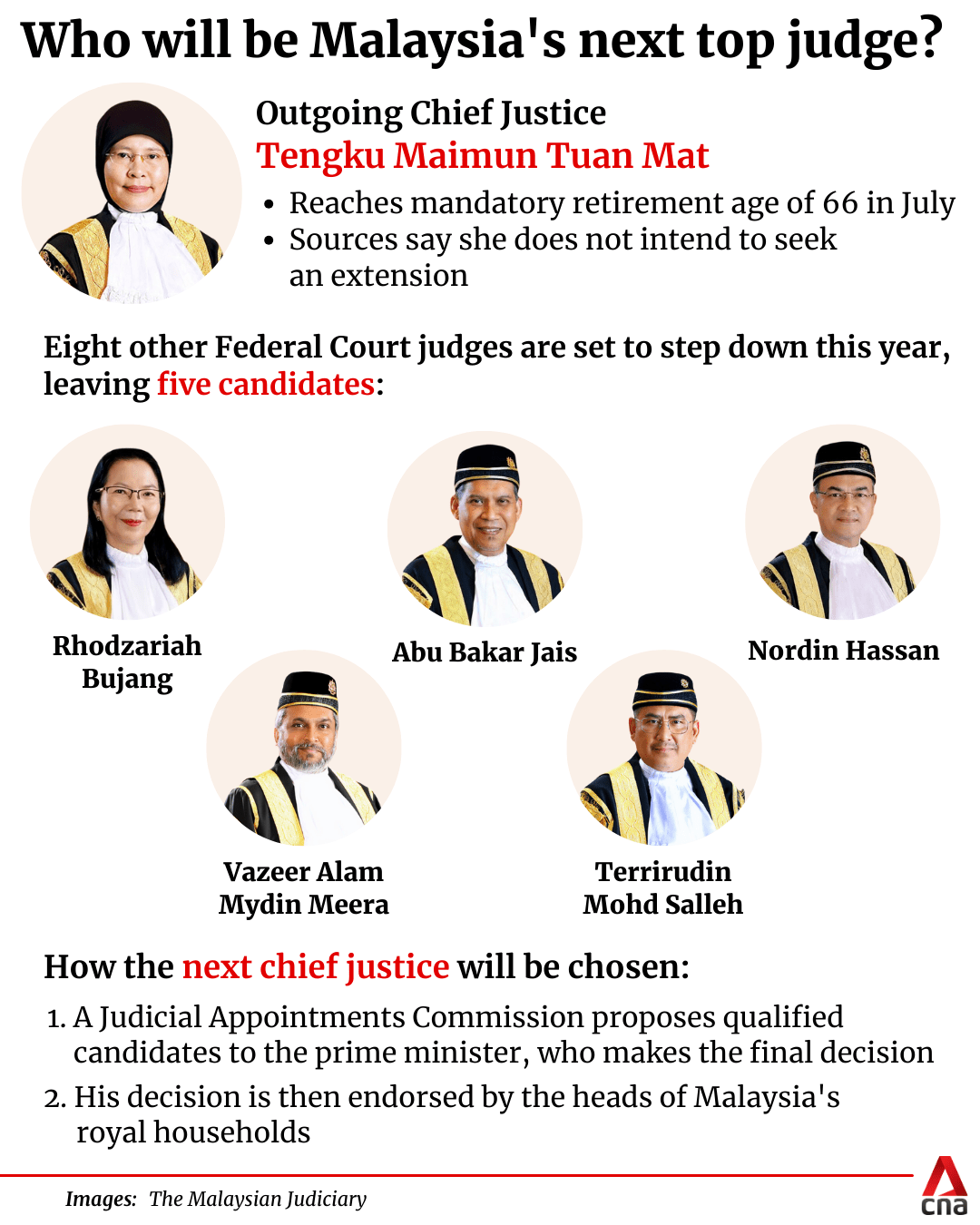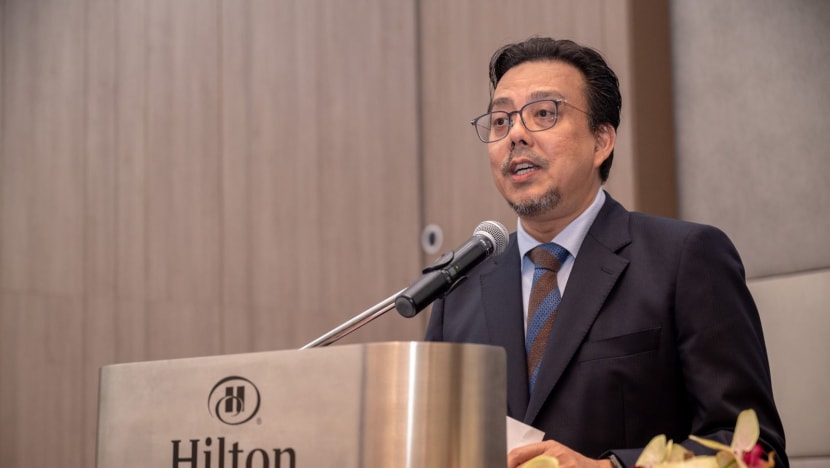'Indefensible': Malaysian Bar slams 'silence' over retiring Chief Justice's fate
Malaysia’s Chief Justice Tengku Maimun Tuan Mat reaches the retirement age of 66 on Wednesday (Jul 2). Amid uncertainty over who her successor will be, or whether her term will be extended, Prime Minister Anwar Ibrahim also weighed in on Monday.

Malaysia’s outgoing Chief Justice Tengku Maimun Tuan Mat. (Photo: Facebook/Badan Kehakiman Malaysia| The Malaysian Judiciary)
PUTRAJAYA: A day before the tenure of Malaysia’s Chief Justice Tengku Maimun Tuan Mat ends, the country’s legal profession on Monday (Jun 30) voiced concern over the “silence” on whether her term will be extended or who her successor will be.
“This level of silence and indecision on matters concerning the highest level of the judiciary is indefensible,” the 21,400-member Malaysian Bar comprising advocates and solicitors said in a strongly worded statement.
“The position of the Chief Justice is not symbolic — it is central to the integrity, independence, and functioning of the entire judicial system. Leaving the post in uncertainty so close to the retirement date reflects a failure in institutional responsibility.”
It is “not merely an administrative lapse”, Malaysian Bar president Mohamad Ezri Abdul Wahab continued. “A breakdown in governance risks damaging public confidence in the judiciary and opens the door to speculation and unhealthy conjecture.”
The Chief Justice is appointed by the king, also known as the Yang di-Pertuan Agong, on the prime minister’s advice and after consultation with the Conference of Rulers.
Tengku Maimun reaches the retirement age of 66 on Jul 2. Concerns surrounding her impending retirement surfaced months ago amid rumblings of possible political interference in new judicial appointments, CNA reported in February.
Stakeholders said how Prime Minister Anwar Ibrahim’s administration moves ahead with the replacement of Tengku Maimun, the country’s first female chief justice, would be closely watched.
Tengku Maimun is highly regarded by the legal fraternity and is credited with burnishing the reputation of the judiciary after what some perceive to be years of blemish.
She is among nine of the 14 judges of the Federal Court, the country’s apex judicial body, who are reaching the retirement age within months of each other.

JUDGES’ APPOINTMENT SHOULD NOT BE POLITICISED: ANWAR
Amid calls by individuals such as former Malaysian Bar president Christopher Leong to extend Tengku Maimun’s term, Anwar also spoke up about the issue on Monday.
He said he has never interfered in judicial matters including the appointment of judges.
"When someone retires, their service is not automatically extended," he said at the Prime Minister's Department monthly assembly.
"Some asked if this is the prime minister's decision? But if one understands the Federal Constitution, they would know the process," he said, as reported by media outlet New Straits Times (NST).
"Just look at the recent appointments where they go to the King, then are presented for discussion with the Conference of Rulers. So all these procedures must be followed."
Anwar said the appointment of judges should not be politicised. He said he has avoided interactions with senior judges except for Tengku Maimun and, even so, only for official purposes.
"I have heard the issues that have been raised. But in all those meetings, I have never interfered in judicial matters," he said.
"Whatever decision they make is entirely theirs. I have never intervened. Yet even that has been politicised."
The Malaysian Bar’s Mohamad Ezri said it fully supports the principle that judicial appointments must be free from lobbying or external pressure.
"However, we caution against conflating legitimate institutional concern and public accountability with politicisation,” he said.

“The Malaysian Bar calls on the authorities responsible to immediately announce the course of action — whether it be an extension or an appointment — in accordance with the Constitution and the Judicial Appointments Commission (JAC) process.”
Malaysia established a JAC in 2009 that proposes qualified judicial candidates to the prime minister, who makes a final decision. His decision is then endorsed by the heads of the country’s royal households who make up the Conference of Rulers.
The JAC Act was meant to ensure that the selection process of judges would be unbiased, but lawyers told CNA previously that, in practice, new appointments often attract intense lobbying by politicians and segments in Malaysia’s royal households.
Anwar on Monday also commented on recent court decisions – namely, the discharge not amounting to an acquittal (DNAA) granted to former prime minister Najib Razak in a 1Malaysia Development Berhad-linked case, as well as the acquittal of Muar Member of Parliament Syed Saddiq Syed Abdul Rahman for graft and money laundering.
Anwar said there was a tendency among the public to judge judicial outcomes based on their political leanings, reported NST.
"In these two cases, I noticed people have differing views,” Anwar said.
"We must understand that there must be wisdom and careful consideration, and there is an independent judiciary in place.
"And it is not my business. Whether I agree or not, my personal opinion is not the issue. We must respect the judges and the decisions they make," he said.
He did not want a repeat of the legal persecution he faced in the past, he added.
"We must remember to uphold the system, not according to political preferences, not based on group interests, and not under lobbying pressure."















